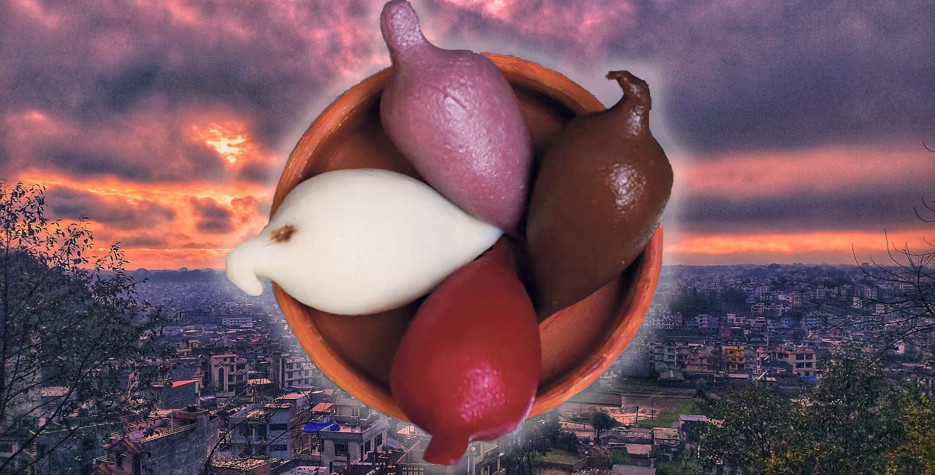When is Yomari Punhi?
In Nepal, on the full moon day of Thinlaa (second month of the Newari calendar) or Marga Shukla Paksha, the Newa community celebrates Yomari Punhi (Yomari Purnima)i. This means it falls in either November or December in the western calendar.
The festival is a four-day celebration to mark the end of the rice-harvesting season. People make yomaris, offer them to Goddess Annapurna or Mother Earth, Goddess Laxmi or Lord Kumar, Lord Ganesh and Lord Kuber with the belief that it will bring wealth, health and prosperity.
A public holiday is often granted to ethnic communities across the country on this day, as it coincides with the Udhauli, Jyapu Diwas and Dhanya Purnima festivals.
Traditions of Yomari Purnima
Yomari (which loosely translates as favourite bread item) is one of the most celebrated confectionaries among the Newari community. Traditionally, a yomari is a cone-shaped steamed dumpling made from refined rice flour mixed with hot water.
The day is also celebrated as Jyapu Diwas or Dhanya Purnima. Whereas Yomari Punhi and Jyapu Diwas are celebrated by the Newa people, natives of Kathmandu, Udhauli is a big festival of the Kirant community. Many other communities also celebrate different festivals on this day in different ways.
The Origin of Yomari
It is said that a married couple from Panauti were the first to experiment and make yomari. Since rice was the main harvest, the couple decided to use the harvest and make yomari out of it. Also, since it was winter, they filled it with chaku (molasses) to give the food some warmth. They offered the yomari to Lord Kuber (god of wealth), who happened to pass by in a disguised form. Happy with the offering, Kuber blessed the couple with wealth. The couple shared their harvest and the yomaris with the neighbours, and it became a tradition to make yomari on this date.
Another legend told about yomari is that of Chhinnapatta Maiju and the fig tree. According to cultural expert and retired Nepal Bhasa professor at Tribhuvan University, Chunda Bajracharya, “In this folklore, we hear the story about two sisters. The elder is Chhinnapatta Maiju, who was disliked by her mother. She had a goat as her friend. Her mother killed her beloved goat and Chhinnapatta took the bones out and buried them in the ground. It is said a fig tree grew out of there and she used to spend more time there.”
She continues, “One day when she was up in the tree, lakhe and lasi: (a demon couple) came and tricked her into bringing the fig down to them. They kidnapped Chinnapatta and took her to their abode. The demon couple made her to make roti (flatbread) for them. While in the kitchen, a mouse came to Chinnapatta and asked for some roti. In return for the roti, the mouse warned her that the demon couple were planning to eat her, so she better escape, and take all the demon's jewels.”
“Seeing her coming back with the jewels, the mother questioned her on what happened. After Chinnapatta told them what had happened to her, the mother directed her younger daughter to get kidnapped and get more jewels from the couple. She was captured, but she ignored the mouse, unlike her sister, and failed to get the warning. The demon couple then ate her.”
The signature shape of the yomari is said to resemble a fig from Chhinnapatta's tree.
As an act of gratitude for the good harvest, it is a custom for the people to offer yomaris to the gods and goddesses. It can be in any shape or size; more common are the signature shape of the yomari while others also make them in the shape of gods and goddesses.
As the day is celebrated in winter, people also follow the tradition of sitting in front of makal (traditional firepots) to keep themselves warm. “Many also eat roasted eggs, garlic, and potatoes while sitting around the fire. However, the tradition is rarely seen nowadays,” Bajracharya adds.
Children also go around to ask for yomari where the households share their fortune by giving it back to the community. Charity on the day is also very common, she adds.
Other traditions include guru puja (worshipping teachers) where people worship books and their teachers.


